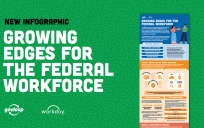Originally posted to the ChatterBachs blog.
Yesterday, I attended the National Defense University iCollege’s
Social Media Conference entitled “Social Media Implementation Across
Organizational Boundaries”. The sessions were informative and
interesting. Below you will find some of my notes. This is in no way
intended to be a comprehensive representation of the sessions but
rather just some of the highlights, based on what stood out to me and
what I can include here without making this blog post too lengthy. In
fact there were two fascinating sessions that I am precluded from
commenting on… you know- national security concerns and stuff like
that… One final disclaimer: I am not going to attempt to make comments
attributable. These are just notes (and not all of the ones I took).
Glean from them what you may. In the process I hope that whether you
participated at #NDUiCollege or not that you find a nugget that
challenges or inspires you in your use of social media. I welcome your
comments, insights, additions/corrections, and questions.
Haiti Disaster Response:
- Made Twitter and Facebook primary tools for getting information out, can turn news over more quickly.
- News used to be a lecture; now it’s a conversation.
- We’re not going to build “the” site that everybody wants to go to. “Survivors of Hotel Montana” on Facebook became a site for all news
related to disaster. Have discipline to take a step back, find the site
where dialogue is happening and contribute
- Opensource mapping: crowdsourced, able to update
- Cell phone migration data: how many people have left? Where have they gone? Needed to deliver services there; they were a strain on the
local economy. We needed them to stay there as long as they could, but
they would need support. Could see movement a month after the
earthquake, not individuals, but based on which cell phone towers were
being used.
- Where do the responsibilities for social media reside? Turnover, new tools. There’s so much out there. Where do you go to pull it all
together?
- Command centers: single points of failure. The more we rely on centralized knowledge, the more we miss out on the benefits of
crowdsourcing.
Social Media Debate:
Social media definition from Wikipedia- web-based tools to create interactive content
Benefits of social media:
1. Communication between people
2. Collaboration- 2005 Wikipedia- 3.9 errors per article; Encylopaedia Britannica- 2.9; 2010 Wiki- 2.8, EB- 2.9
3. Creates situational awareness/transparency
4. Information captured
5. Sharing knowledge
6. Post questions/get answers
7. Find information
8. Get access to communities of practice- shout out to GovLoop
- Communities not limited to time and space
- It’s not either/or; it needs to be implemented
Risks:
- We put a lot of information on the internet. Some that we put on social media sites that we wouldn’t announce in a room of 400: birthday,
address, where you went to school
- Think before you post.
- Security settings.
- Robin Sage: Intelligence Analyst, fake Facebook profile
- 80 million queries on Facebook in 30 seconds, 80% of those come from outside the US.
- People collecting data for whatever their purposes are.
Government as Enterprise: Beyond the Silos with Social Media
- Not just about the story that we have to share but about what we build together
- Have the public shape the story of government and what it should be
- Open government- what are the ways that we can open up and collaborate?
- Do we need standards? Do we need policies?
- Convergence- you can tweet a message with a link to YouTube and simultaneously put that on Facebook for friends and colleagues on
LinkedIn.
- Data sets are just data sets; it’s the conversations that happen around those data sets.
- Regionality is captured in a virtual world.
- Data.gov- it’s what the American people think that they can do with the data. 250 applications that help people makes decisions.
- Not that the hierarchy disappears; it’s that it just works a different way




Great summary, Jay. Here’s some of my additional take-aways as well as my notes on the last session that you missed:
– Twitter hashtag #nduicollege was announced and encouraged
– The Haiti situation was very unique and not necessarily a model that can be repeated easily; for instance, in most cases cell phones would be dead and not helpful after a day or so, but many Haitians have generators due to limited electric resources … one innovative entrepreneur quickly set up a business (service?) charging cell phones with his generator.
Last Session: Industry Overview:
Cisco – releasing suite of social networking products within two weeks
Oracle – building a search engine for organizational internal use that ranks documents/pages based on activity of author/editor rather than internal content/links like Google.
Great to meet you there and see ‘behind the shades’!
Again, huge thanks for posting your notes, Jay. For a complete roll-up of the conference’s twitter hashtag, go to http://twapperkeeper.com/hashtag/nduicollege and put the date/time parameters for what you want to review.
Thanks for the additions, Sam. Vern, I appreciate the kind words. Thanks also for providing the TwapperKeeper link. I’ll check it out.